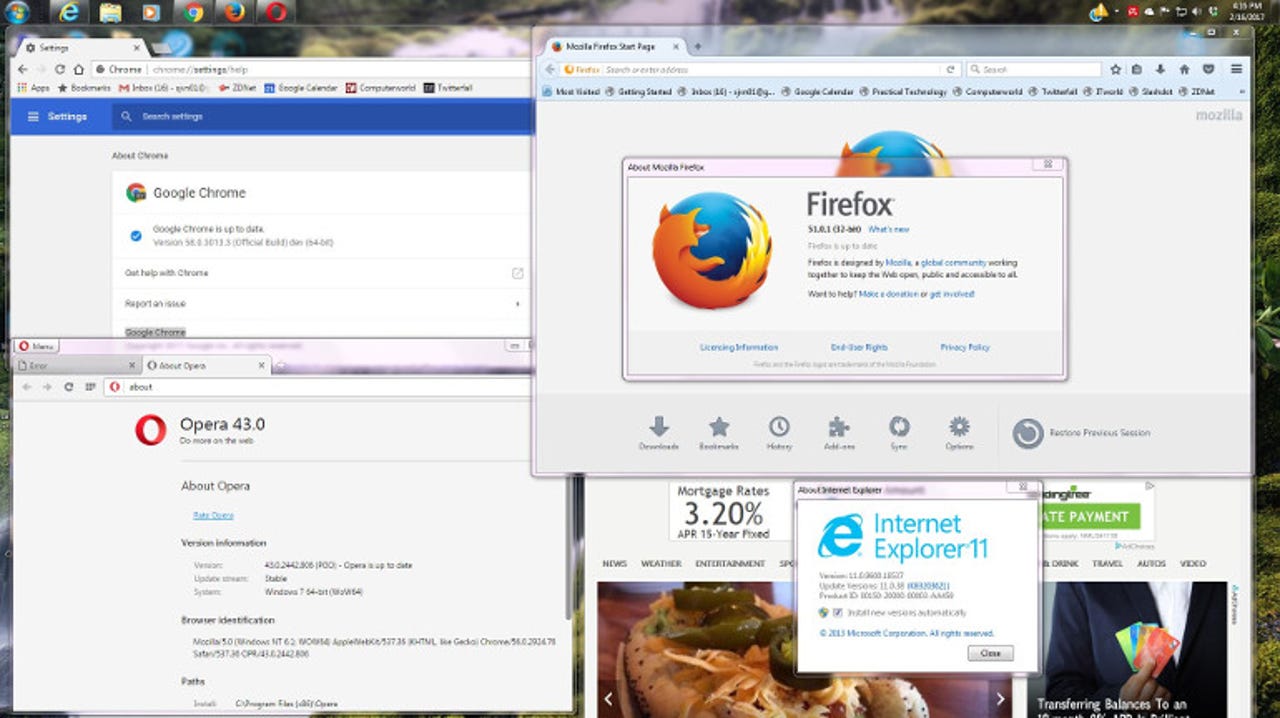What's Windows 7's fastest web browser?

Windows 7 is still a sight more popular than Windows 10. By Federal Digital Analytics Program (DAP)'s count, Windows 7 has a serious lead over Windows 10 -- 25.2 percent to 17.4 percent. So, Windows 7's web browser speeds matter a lot. Here's what the benchmarks tell us.

Chrome is number one, but Opera is giving it competition. Firefox lags behind and IE, oh dear, IE is just terrible.
First, though, in terms of popularity, DAP makes it clear Chrome is the most popular web browser of them all. Internet Explorer (IE), which once ruled the browser roost, dropped behind Chrome for good in 2016.
More Microsoft
But does Chrome have the performance chops to justify its popularity? Let's find out.
To put Windows 7's web browsers to the test I put them through their paces on the latest shipping edition of Windows 7 SP 1 Ultimate. This ran on my Windows 7 test PC, a Gateway DX4710.
This older PC is powered by a 2.5-GHz Intel Core 2 Quad processor and has 6GB of RAM and an Intel Graphics Media Accelerator (GMA) 3100 for graphics. It's hooked to the internet via a Gigabit Ethernet switch, which, in turn, is connected to a 100Mbps (Megabit per second) cable internet connection.
On this system, I benchmarked Internet Explorer (IE) 11, Chrome 56, Firefox 51, and Opera 43. I no longer test Safari because Apple doesn't release major Safari updates for Windows anymore. The 2012 version of Safari, 5.1.7, with some security patches is still available, but it's too dated to use.
For each round of testings, I ran freshly installed vanilla web browsers after rebooting the system. Then, I ran the following benchmarks.
JetStream 1.1: This JavaScript benchmark builds on the foundation of the obsolete SunSpider. It combines several JavaScript benchmarks to report a single score that balances them using geometric mean. JetStream includes benchmarks from the SunSpider 1.0.2 and Octane 2 JavaScript benchmark suites. This test suite also includes benchmarks from the LLVM compiler open-source project, compiled to JavaScript using Emscripten 1.13. It also includes a benchmark based on the Apache Harmony open-source project's HashMap and a port of the CDx real-time Java benchmark, hand-translated to JavaScript. On this benchmark, larger scores are better.
Chrome, as it so often has in previous tests, won with a score of 85.26. Second place was a surprise: Opera. Opera has been declining in popularity for years. It now claims less than 2 percent of the desktop browser market. Still, Opera has respectable turn of speed with 81.93.
Firefox took third with 76.44. IE came in dead last with 64.47.
Kraken 1.1: This benchmark, which is descended from SunSpider, also measures JavaScript performance. To this basic JavaScript testing, it added typical use case scenarios. Mozilla, Firefox's parent organization, created Kraken. With this benchmark, the lower the score, the better the result.
Here, Chrome came in first once more with with a score of 2,267.6 milliseconds (ms). Opera came in second with a score of 2,585.9ms. Firefox was close on its heels with 2,850.4ms. IE was a distant last with 5,094.4ms.
Octane 2.0: Google's JavaScript benchmark also includes scenario testing for today's interactive web applications. Octane is not Chrome-specific. For example, it tests how fast Microsoft's TypeScript compiles itself. On this benchmark, the higher the score, the better.
And, the winner was ... Opera! This time it won with 14,863 points. Second went to Chrome with 14,426. Close behind it came Firefox with 14,157 points. Far, far in the back IE limped to the end with a score of 7,778.
WebXPRT is today's most comprehensive browser benchmark. It uses scenarios created to mirror every day tasks. It contains six HTML5- and JavaScript-based workloads: Photo Enhancement, Organize Album, Stock Option Pricing, Local Notes, Sales Graphs, and Explore DNA Sequencing. Here, the higher the score, the better the browser.
On this test, Chrome took gold with 187 points. Firefox got the silver with a score of 183. Opera held on to the bronze with 161. And, once more, IE was in the back of the pack with 150 points.
HTML5 Test: Finally, I checked to see how well each browser complies with the HTML5 web standard. This "test" isn't a benchmark. It just shows how close each browser comes to being in sync with the HTML5 standard. A perfect score, which no one got, would have been 550. If your web browser has trouble with today's web standard, it doesn't matter how fast it is.
Opera re-emerged to take first with 526 points. Chrome came in second with 519, while Firefox was in third with 471? IE? You guessed it. At the bottom of the pile with 302.
The lesson is clear. Chrome deserves its popularity. That said, Opera is worth considering.
As for Firefox, well it's OK, it's not great, but it's OK.
If you're using IE, on the other hand, stop. Just stop. It's simply second-rate compared to the others. When I looked at Windows 10 and IE, I wondered if Microsoft was just giving up on it. On Windows 7, I don't have that question. IE has become abandonware.
Related Stories: